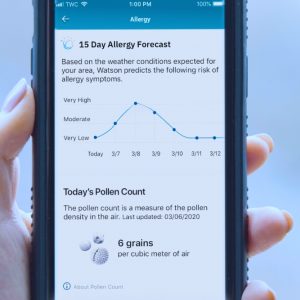Allergy sufferers care a lot about what goes on outside with allergens, pollen, air quality, and more. In fact, 68% of allergy sufferers surveyed use weather forecasts and information to help manage their seasonal allergies (Source: AdSales AI Health & Weather Impact Study, Sept 2019).
As spring continues and summer nears, The Weather Channel data science team has been working to create a resource to help seasonal allergy sufferers. Now available for no charge on The Weather Channel app and weather.com, Allergy Insights with Watson is a new feature that uses AI to help predict the seasonal allergy risk in your area of the United States. With IBM Watson, The Weather Channel offers actionable insights and alerts with a 15-day forecast to help people make more informed decisions and prepare during allergy season.
In researching the issue, the team found that about 60% of people surveyed are self-diagnosing allergy risk based mainly on three pollen metrics – tree, grass and ragweed levels – which is what most trackers (including the previous one by The Weather Channel) use to assess allergy risk. Our scientists actually found that pollen sources are unreliable, spotty and only cover a small subset of species, but also that pollen is not a good predictor of seasonal allergy risk or of how you’ll truly feel.
To repeat: Pollen alone is not a good predictor of allergy symptom risk.
In fact, the team found that using AI and weather data instead of just pollen data resulted in a 25-50% increase in making better decisions based on allergy risk levels, such as taking medication preemptively. Pollen levels are still shown for those who know which allergens affect them, but this is one of the first – if not the first – allergy prediction models that does not focus largely on pollen.
The team used IBM Watson machine learning for local model training of the data in order to help deliver a forecast that’s able to assess the underlying conditions that cause allergens or symptoms and predict your seasonal allergy symptom risk in a given U.S. location. It combines the world’s most accurate weather data from The Weather Company – conditions that affect allergy triggers such as temperature, humidity, precipitation, wind and dew point – with anonymized health data and location data (used to understand the environment and local flora).
These data inputs combine with AI technology to meet the scale of The Weather Channel digital properties, which see more than 300 million users monthly and live on the IBM Cloud. Pollen data and air quality data were excluded from the predictive model, since they proved unreliable indicators of seasonal allergy risk, but will continue to be reviewed. References to time of year were also removed, since the start of allergy season has changed over time due to climate change.
Allergy Insights with Watson offers:
- A 15-day forecast to predict seasonal allergy risk level (high, moderate, low), as well as a 3-day forecast for specific seasonal allergens.
- Notifications when seasonal allergy risk is changing to high or dropping to low in the next three days, as well as when you’ll see an elevated level over the next three days.
- Explanations of the correlation with weather and how different weather conditions can potentially affect seasonal allergy risk.
- Pollen levels by allergen (tree, grass and ragweed), as well as push alerts when the level is high, for those seasonal allergy sufferers who know which affect them most.
- Tips to help you reduce seasonal allergen exposure, as well as news articles and editorial content related to allergies
While no two allergy sufferers are the same, knowing in advance when symptom risk might worsen, improve or remain the same can help anyone plan ahead and take action before symptoms may flare up.
Now available for no charge on weather.com and The Weather Channel app for iOS and Android, check your local allergy risk using Allergy Insights with Watson to stay informed this season.





